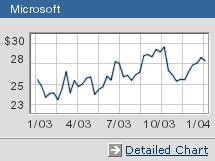NEW YORK (CNN/Money) -
Let's play the CNN/Money version of the $25,000 Pyramid game show. Name the common thread: The terrain in Kansas. An opened bottle of soda. Pancakes. Microsoft's stock price.
Hmmm. Things that are flat?
That's right. Microsoft (MSFT: Research, Estimates) has not participated in the explosive tech stock rally of the past year. Shares rose only 7 percent in 2003, compared to a 50 percent move in the Nasdaq. And so far this year, the stock has moved up about 2 percent while the Nasdaq has already tacked on another 6 percent.
The problem is that investors have been directing their attention toward tech companies that appear to be on the verge of a big upswing in profit growth. Microsoft doesn't seem to fit that description.
But a promising fiscal second quarter report after the bell Thursday could help change Wall Street's perception of the world's largest software firm.
Growth needs to be rooty tooty fresh and fruity
Analysts are expecting Microsoft to report 11 percent earnings growth, with 30 cents a share (excluding compensation costs associated with its new restricted stock program), up from 27 cents a year ago.
Sales are forecast at $9.7 billion, a 14 percent increase from the same period last year.

| |
|
Shares of Microsoft have barely budged in the past year even as other techs have surged.
|
|
That's well above the single-digit growth Microsoft has posted in recent years, but even so, Wall Street will want more -- and it may just get it.
Kimberly Caughey, an analyst with Parker/Hunter, thinks that Microsoft could report an upside revenue surprise thanks to strong sales of personal computers during the holiday season.
Another factor that could help Microsoft would be the continued weakness of the dollar, which inflates the value of sales from locations outside the U.S.
But ultimately, Microsoft will need to report signs of increasing demand: "Wall Street tends to look past near-term currency fluctuations and at on-going operations, numbers that are repeatable," said Michael Cohen, director of research for Pacific American Securities.
When will be license renewals be on the menu?
Investors will also be keeping a close eye on Microsoft's unearned revenue. This number, also called deferred revenue, refers to sales that the company expects to book on its income statement in coming quarters from subscriptions. Microsoft's unearned revenue is a crucial gauge of future sales.
| More about Microsoft
|

|
|
|
|
Last quarter, unearned revenue was a big disappointment, at $8.2 billion, down a higher than expected 8.5 percent from the prior quarter. For the fiscal second quarter, analysts are again predicting a drop in unearned revenue, but the hope is that the decline won't be as steep.
If Microsoft wants to quiet the naysayers, it will need to eventually report an improvement in unearned revenue. Unfortunately, that might not occur until the second half of the year, analysts said.
"If unearned revenue keeps sliding, it suggests the growth story for Microsoft has gotten long in the tooth and that would raise more worries about the valuation," said Richard Williams, an analyst with Summit Analytic Partners.
Microsoft is trading at about 25 times fiscal 2004 earnings estimates, which seems pricey considering that analysts are expecting earnings growth of only about 9 percent for fiscal 2004 and 2005.
So what Microsoft needs to prove to Wall Street is that these estimates are too low.
David Hilal, an analyst with Friedman Billings Ramsey, said one way Microsoft could do that is if it shows healthy levels of growth from Microsoft's server business, which includes the SQL Server database software as well as the Windows Server version of its Windows operating system.
Despite healthy demand for personal computers as of late, Hilal said that Microsoft's future lies more with corporate purchases of software for servers. The company's server and tool business accounted for nearly a quarter of total sales in its first quarter and sales growth here is helping to offset sluggish growth in Microsoft's client division, which includes the traditional operating systems for PCs, and its information worker unit, which includes sales of its Office software .
"Can Microsoft deliver growth? The desktop business is fairly mature. The best way to grow is in the server group," Hilal said.
Microsoft, like many other tech companies, hopes to benefit from a pickup in spending by large corporations. And all indications are that the overall economy is improving. But until there's some evidence of this in Microsoft's results, the stock price performance will probably remain as flat as, well...
Would you like some syrup and blueberries with that stock?
Pacific American's Cohen and Parker Hunter's Caughey own shares of Microsoft but their firms have no investment banking ties to the company. Summit's Williams and FBR's Hilal don't have a position in Microsoft and their firms have no investment banking relationships with the company.

|

